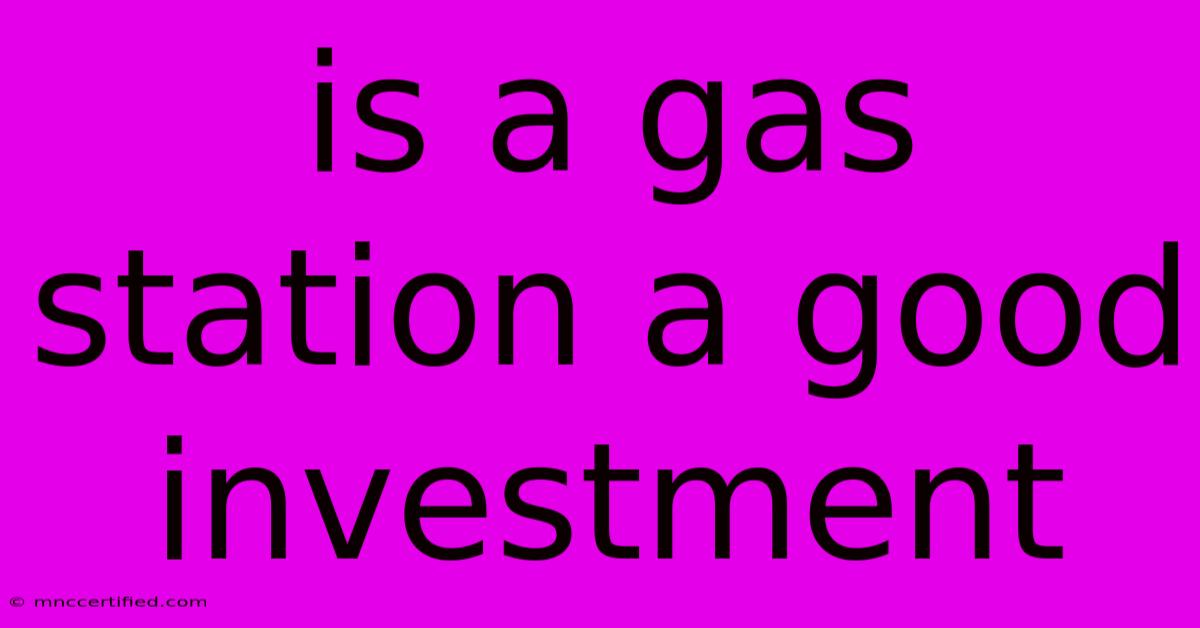Is A Gas Station A Good Investment

Table of Contents
Is a Gas Station a Good Investment in 2024? A Comprehensive Look
The allure of owning a gas station is undeniable. High traffic locations, essential goods, and the potential for substantial profits can be very tempting. But is investing in a gas station truly a good idea in 2024? The answer, like most investment questions, is: it depends. This article delves into the pros and cons, exploring the factors that determine whether a gas station represents a sound financial venture for you.
The Alluring Pros of Gas Station Ownership
-
High-Volume Sales and Consistent Demand: Gasoline is a necessity. Regardless of economic fluctuations, people need to fuel their vehicles. This consistent demand translates to relatively stable sales, even during downturns. This is a key differentiator compared to other retail businesses.
-
Multiple Revenue Streams: Modern gas stations are far more than just fuel pumps. Many offer convenience store items (snacks, drinks, tobacco), car washes, lottery tickets, and even quick-service food options. These diverse revenue streams can significantly boost profitability.
-
Real Estate Value: The underlying real estate often holds significant value. A well-located gas station, particularly on a busy highway or in a high-growth area, can appreciate considerably over time, providing a valuable asset beyond the business itself. This is an often overlooked aspect of the investment.
-
Potential for High Profit Margins: While the profit margin on gasoline itself can be thin due to competition, the convenience store items usually carry higher margins. Effective inventory management and smart pricing strategies can maximize profits from these ancillary offerings.
The Challenging Cons of Gas Station Ownership
-
High Initial Investment Costs: Starting a gas station requires a substantial upfront investment. This includes the cost of land acquisition or lease, building construction or renovation, equipment purchase (pumps, tanks, point-of-sale systems), and initial inventory. Securing sufficient financing is crucial.
-
Intense Competition: The gas station industry is fiercely competitive. Major brands, independent operators, and even supermarkets with fuel stations all vie for customers. Differentiation through excellent customer service, unique offerings, and competitive pricing is essential for success.
-
Strict Regulations and Compliance: Gas stations are heavily regulated, requiring strict adherence to safety standards, environmental regulations, and licensing requirements. Non-compliance can lead to hefty fines and potential legal issues. This adds a layer of complexity beyond other retail investments.
-
Operational Challenges and Labor Costs: Gas stations require around-the-clock operation, necessitating employee staffing, which can be a significant expense. Managing inventory, ensuring security, and maintaining equipment are ongoing operational challenges.
-
Market Volatility and External Factors: Fluctuations in gas prices, economic downturns, and changes in consumer behavior (e.g., increased adoption of electric vehicles) can significantly impact profitability. Understanding market trends and adapting to changes is critical.
Is it Right for You? Key Considerations
Before investing in a gas station, thoroughly assess the following:
- Market Analysis: Conduct a comprehensive market analysis of your target area, including competitor analysis, demographics, and traffic patterns.
- Financial Planning: Develop a detailed business plan with realistic financial projections, including start-up costs, operating expenses, and revenue forecasts. Secure sufficient funding and explore all financing options.
- Management Expertise: Effective management is crucial. Do you possess or can you acquire the necessary skills to manage inventory, staff, marketing, and regulatory compliance? Consider hiring experienced personnel.
- Risk Tolerance: The gas station business involves significant risk. Are you prepared for potential losses and market volatility?
In Conclusion:
A gas station can be a profitable investment, but it's not a get-rich-quick scheme. Thorough due diligence, meticulous planning, strong management, and a high tolerance for risk are all essential for success. Carefully weigh the pros and cons, conduct thorough research, and seek expert advice before making this significant financial commitment. The potential rewards are considerable, but so are the challenges. A well-planned and executed gas station venture can be highly lucrative, but only with careful consideration and planning.

Thank you for visiting our website wich cover about Is A Gas Station A Good Investment. We hope the information provided has been useful to you. Feel free to contact us if you have any questions or need further assistance. See you next time and dont miss to bookmark.
Featured Posts
-
Chelsea Wins Claims Wsl Top Position
Nov 17, 2024
-
Week 12 Clemson Vs Pitt Final Score Highlights
Nov 17, 2024
-
Georgia Football Wins Bulldogs Beat Tennessee
Nov 17, 2024
-
Examfx Life Insurance Test Answers
Nov 17, 2024
-
Final Betting Odds Lsu Florida Game
Nov 17, 2024